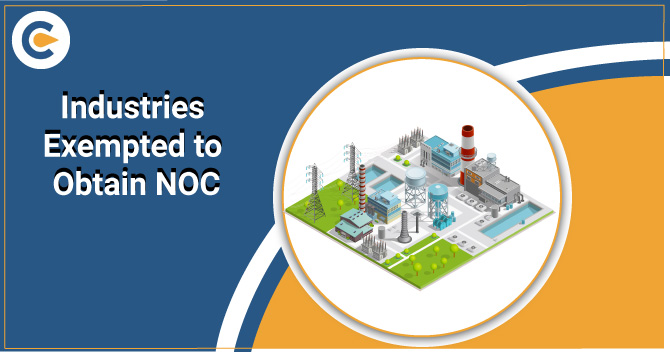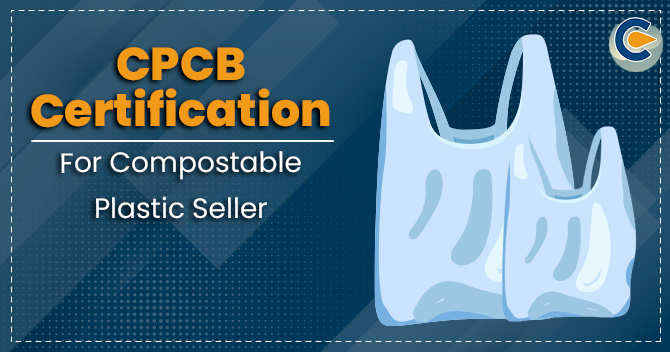Some of the industries which are established or being established have been exempted for the list for obtaining the NCO or consent for the Pollution Control Board. The exemption from obtaining NOC is provided on some specific criteria and according to the industry’s steps to control the hazardous activities.
Reasons for Exemption of Industry from Obtaining NOC
The exemption from obtaining the consent of the Board under the provisions of the Water (Prevention & Control of Pollution) Act, 1974 and Air (Prevention & Control of Pollution) Act, 1981 and Hazardous Waste (Management & Handling & Transboundary Movement) Rules, 2008, for the above 131 categories of industries, if the unit satisfies the following conditions:
- The industry is established or being established in the demarcated Industrial Estates/Zones classified by the State Authorities viz PSIEC, Department of Industries, PUDA, CTP (Chief Town Planner) under a draft master plan or in mixed category area of predominantly industrial areas within Municipal limit of a town after classification of the area by CTP/STP/DTP.
- The investment of the industry is not more than Rs. 1 Crore on plant and machinery.
- The industry’s investment is not more than Rs. 2 Crore on plant and machinery for hosiery units.
- There will not be any discharge of trade effluent from the industry into stream or well or sewer or onto land, and that industry will not discharge any air pollution, including noise into the atmosphere.
- The industry will not discharge any toxic/hazardous wastes and will not handle any poisonous and hazardous chemicals.
In case the industry is found to create conditions that generate any type of pollution, or if there is any objection from the surrounding community and if on verification, it is found that such objection has some substance, the Board is free to take legal action against the industry under the provisions of the Water (Prevention & Control of Pollution) Act, 1974 and Air (Prevention & Control of Pollution) Act, 1981 of Environment (Protection) Act, 1986 as considered appropriate.
Read our article:Consent for NOC from State Pollution Control Board
Conditions for Exemption from Obtaining NOC


List of Industries Exempted from Obtaining NOC
- Aggarbatti and other cosmetic products manufactured by blending (Dry Process)
- Air conditioners, Water Coolers, Room Coolers & heaters without, wet process
- All types of toys and Doll making electrical without wet process
- Aluminum utensils from aluminum circles (without any wet process)
- Aluminum, Stainless Steel, Brass Vessel is marking units that have the only process, spinning without buffing, polishing, pickling, washing, Hot/Cold rolling annealing furnace, and anodizing processes.
- Assembling of Door closer and Rings
- Assembly of air coolers and conditioners repairing and servicing
- Assembly of the bicycles baby carriage and other small non-motorized vehicles
- Assembly of Computer, Computer Software, and Computer peripherals.
- Atta Chakki and Millet grinding.
- Audio, Video, and consumer electronic equipment assembly only.
- Automobile Bodybuilding without wet process.
- Automobile Repair Workshop. (without any wet process)
- Ayurvedic and Homeopathic medicine (without boiler)
- Bailing (hydraulic press) of waste papers(without any wet process)
- Beauty Parlour
- Beekeeping
- Belt Fastener units without a wet process
- Bindi making units
- Bio-gas
- Biscuit trays from rolled PVC sheet (using automatic vacuum forming machine)
- Biscuits, Pastries, Cakes, Confectionery, Bread, Bakery up to 100 kg/day
- Black Smithy Shop
- Blending and packaging of Tea
- Block making for printing without foundry (exclude the wooden block making)
- Block making, Printing, Offset Printing
- Book Binding
- Brass & Bell metal utensils manufacturing from a circle (without re-rolling facility)
- Brush making units with fiber/plastic wire
- Candle manufacture
- Carpentry & furniture units without Seasoning
- Carpentry and wooden furniture manufacturing (excluding sawmill) with the help of electrical (motorized) machines such as electric wood planner, steel saw cutting circular blade, etc.
- Carpet weaving
- Cement products (without using Asbestos) like a pipe, pillar, Jafri, well ring, blocks/tiles, etc. should be done under closed covered shed to control fugitive emissions)
- Ceramic color manufacturing (not using boiler and wastewater recycling process)
- Chewing Tobacco
- Coated electrode manufacturing
- Cotton Belts and Tapes/Cotton Nilwar etc.
- Cotton cloth Knitting
- Cotton quilt and mattresses making
- Cotton socks-knitting
- Crown cork making units
- Dairy farming (Rural Area points periphery of half KM)
- Decoration of ceramic cups and plates by the electric furnace
- Diesel Generator sets up to 15 KVA
- Diesel pump repairing & servicing
- DPC coating of copper and aluminum wire without any wet process.
- Drawing, Surveying, and Scientific instrument are making with no wet process.
- Dry Grinding of spices.
- Electrical & electronic items assembling
- Electrical Switches, accessories making, and the Panel Board without wet process.
- Electrical/electronic testing and measuring instruments without a wet process.
- Electronic Components without the use of chemicals
- Embroidery
- Engineering good mfg. Units without a wet process
- Engineering Workshops, Machine Shop, Press Shop, Sheet Metal fabrications including steel furniture rolling shutters grinding, fabrication (without foundry, pickling, electroplating, galvanizing and without any discharge of water/oil)
- Fabrication units connected with animal-drawn vehicles, trailers without any heat treatment, furnace use i.e., with no emissions
- Finished leather goods, conversion of finished without wet process
- Fish Ponds
- Flavoured bettle nut production/grinding
- Floor Polish, Nail Polish, Tooth Powder, Hair Oil, Shampoo, and Tooth Paste with blending only.
- Fountain pen manufacturing
- Garments manufacturing without wet process
- General Wire Industries like wire drawing, barbed wire, Chain links, making units without wet process
- Glass ampoules & vials making from glass tubes
- Gold/Silversmithy shops with no water or chemical use
- Green House/Floriculture under Mechanized process under controlled temperature
- Groundnut decorticating (dry)
- Hand Tools without casting
- Handicraft[1]
- Handlooms without wet process
- Household appliances and the kitchen equipment, without wet process
- Insulation and coated papers manufacturing (excluding paper or pulp manufacturing)
- Jobbing and machining
- Knitting cloth/Fabrics (Small Scale) Dry process.
- Lathe and Welding sets (only electrical) without casting.
- Leather cutting and stitching (more than ten machines and using motor)
- Leather footwear and leather products (excluding tanning and hide processing) (except cottage scale)
- Manufacture of Cement Blocks/Jallies etc.
- Manufacture of Steel trunks/boxes/drums/Shutters.
- Manufacturing of optical lenses (using electrical furnace)
- Manufacturing of shoe brush & wire brush
- Marketing/Industrial Consultancy/Advertising Agencies.
- Mechanical clock/watches etc.
- Medical & Surgical Instruments and equipment without a wet process.
- Mfg. of Transformers without polychlorinated Hydrocarbon
- Mosaic tiles, cement pipes. Spun pipes manufacturing units
- Motor and Pump Making without foundry and wet process
- Mushroom cultivation under controlled conditions/temperature
- Musical instrument with no wet process
- Non-conventional Energy items
- Nut cracking & roasting
- Oil extraction by kohlus or expellers without a boiler
- Oil mill ghani & extraction (no hydrogenation/refining)
- Optical Frames and glasses without wet process
- Organic manure (manual mixing)
- Orthopedic equipment without casting/wet process.
- Packing and Processing of items using the Mechanized Process.
- Packing materials manufacturing from non-asbestos fiber, vegetable fiber yarn
- Packing of Agricultural/Forest Produces under controlled Temperature (Mechanised Process).
- Packing of powdered milk
- Paints and varnishes (mixing and blending) (without ball mill) (without any wet process)
- Paper Pins, ‘U’ Clips, pen Holders, pen & paper products without wet process
- Paper Products without wet process
- Plastic Niwar from monofilament yarn
- Polythene Bags from Monofilament Sheets/polythene sheets
- Power loom Weaving (Small Scale) Dry process
- Preparation of Photo identify the card by using video camera-laser printing
- Puffed rice (muri) (using oil gas or electrical heating system)
- RCC Bricks
- Repairing of electric motor & generator
- Seed Processing Units/hybrid Seeds- Mechanized process
- Sericulture units.
- Small restaurants, coffee/Tea shops, and Snack Bars
- Solar Energy Panel makings.
- Spinning (Small Scale) Dry process.
- Sports Goods without leather tanning & other wet processes.
- STD Booth/cable TV NetWork/EPBAX.
- Steel furniture without spray painting
- Surgical and medical products not involving effluent/ emission generating processes
- Tailoring Shop as SSSBI
- Tea Grading and packing
- Telecommunication equipment without wet process
- Typing Centre/Xeroxing
- Tire retreading (only cold Processing)
- Umbrellas, Raincoats, Tarpaulins without wet process
- Weigh Bridge
- Weighing machines with no wet process
- Welding Electrodes
- Wooden and corrugated Crates and Boxes
- Zip Fasteners
Conclusion
The industries that are exempted from obtaining NOC’s list have to prove that their nature of work is environmentally friendly. The work done is in the industry does know to require any type of consent form the Pollution Control Board. CorpBiz shall be happy to serve you to assist in any concern relating to Pollution Control Board Services.
Read our article:What are the Powers and Functions of Pollution Control Board?











